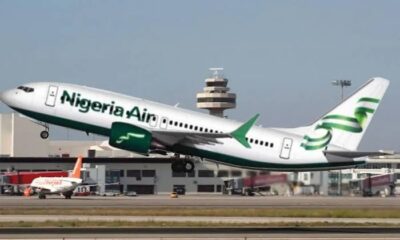Emerging reports say that the Nigerian government on Wednesday in London unveiled a new national airline to be known as Nigeria Air.
The ceremony comes 15 years after the former Nigeria Airways went moribund and literally got buried. The official unveiling of name and logo of the country’s new flag carrier, came in the absence of any fleet for the airline.
Named Nigeria Air, Presidency officials say that the new enterprise “will bring Nigeria closer to the world.”
The Wednesday ceremony held at the Farnborough International Public Airshow in London. Speaking at the event, Nigeria’s Minister of State for Aviation, Sen. Hadi Sirika, said the federal government would not interfere in the management of the business.
“It is a business, not a social service. Government will not be involved in running it or deciding who runs it. The investors will have full responsibility for this,” he said.
Sirika, in a tweet via his official Twitter handle, Tuesday, said he had negotiated Aircraft orders with Airbus of Farnborough and planned to meet with Boeing and other suppliers.
“We intend to get a 30 aircraft market in five years. But we will begin with five aircraft on the day of launch,” he said.
Read Also: All you need to know about sack of Mozambique airline board
The Nigerian government appears eager to learn from the mistakes of the past. Alluding to government plans to stay away from directly managing the business, the Director General of Infrastructure Concession Regulatory Commission (ICRC), Chidi Izuwah, said:
“Though, you need that initial government financial to make it take off, but what is important is that the national carrier will be entirely private sector controlled.
“There will be zero government interference. But if that happens, it invalidates the certificate (Outline Business Case Certificate of Compliance for the establishment of the airline) and the entire process.”
Attempts to resuscitate Nigeria Airways led to a joint venture between Nigerian investors and Richard Branson’s Virgin Group but this crashed in 2012 due largely to what was considered undue government interference and refusal to stay within the letters and spirit of the contract.

 Sports2 days ago
Sports2 days ago
 Metro2 days ago
Metro2 days ago
 Metro1 day ago
Metro1 day ago
 Culture2 days ago
Culture2 days ago



























